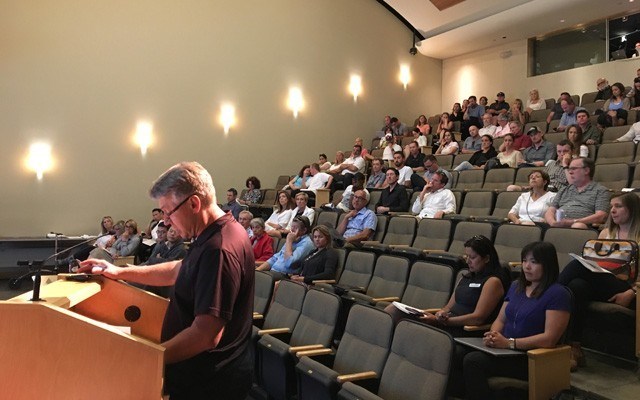Changes are coming to the public input portion of Whistler council meetings.
On April 18, Whistler’s mayor and council approved a six-month pilot project, ending Oct. 18, that will change the way people can ask questions of council and alter the format of the public question and answer (Q&A) period, with significant changes to how much and what kind of public input is allowed at council meetings.
Speakers will be restricted from asking questions or commenting on anything unrelated to topics on the agenda (as well as agenda items from the previous two meetings) and are required to sign up to speak ahead of the meeting (or in-person at the meeting). The new rules propose a 30-minute time limit for the Q&A while also allowing the meeting chair to extend it.
The new format will also allow the public to make comments in addition to questions, while reducing each speaker’s time from five to three minutes (tracked by a clock on the podium).
“What I’m most excited about is the opportunity for the public to stand there and make a comment rather than being forced into asking questions, and I think that honours the intentions of the people who come here to participate in the public process,” Mayor Jack Crompton said. “Some of them want to ask questions, many want to share comments, and that’s a significant change and is what was most interesting to me through this process.”
Whistler resident Brandon Green raised concern at the council meeting that the restriction of questions to agenda items only will limit the public from holding their mayor and council to account, on the record, for issues that won’t make it on the agenda, citing the RMOW suing Pique Newsmagazine in 2021 as an example.
Crompton argued that this change will keep the meetings focused on the agenda and that there would be more opportunities for the public to make their concerns heard. He also encouraged people to contact himself and the councillors directly with concerns and queries.
“I think what you’re seeing today in the proposal is a desire to ensure that this meeting functions to accomplish the business of the day. You’ll be able to ask questions based on anything in the last two meetings, I believe,” Crompton said. “Our goal is to learn something about how we do our work. And that’s what I think a pilot project intends to do—learn what’s working and learn what may not be working and improve as we go.”
Prior to the vote, Councillor Jessie Morden introduced an amendment to strike the three-minute time limit and the agenda-specific restriction from the pilot, citing concerns raised during last fall’s election campaign.
“During the campaign, I heard a lot of comments from residents that don’t feel that there is either enough community engagement or opportunities for community engagement, and I feel like this is an opportunity for them to engage with all of us all at once,” Morden said.
The motion failed, with all except Morden opposed. A subsequent proposed amendment to strike just the agenda restriction also failed, with just Morden and Coun. Ralph Forsyth voting in favour. Ultimately, the pilot was approved in a unanimous vote.
Under the current rules, Whistler council Q&As can range from minutes to hours, depending on the number of questioners and the amount of questions they ask.
A staff report notes that the vast majority of questions brought before mayor and council in 2021 were inapplicable to any agenda item, with 48 out of 61 questions (80 per cent) unrelated to the agenda of the day. The number of unrelated questions decreased to 56 per cent in 2022, due mainly to the hours-long marathon Q&A session regarding the Northlands Development and potential relocation of the Whistler Racket Club, where more than a dozen people asked questions about the proposed rezoning.
To understand how these changes stack up against other communities in B.C., the RMOW legislative affairs department surveyed 50 of the 161 municipalities in the province and received responses from 30. Of those, the RMOW found that 73 per cent allowed public Q&A, while eight municipalities did not. Only three municipalities required the public to register before the meeting, putting Whistler well into the minority in that regard.
At the same time, 52 per cent required the speakers to focus on an agenda item of the day. The placement of the Q&A in each municipality’s agenda differed from town to town, with most surveyed communities fielding questions at the end of the meeting.
The pilot will begin on May 16, and the RMOW will create a communications plan to explain the process to the public; a new sign-up form for questions and comments; and a public feedback tracking tool. At the end of the pilot, staff will create a final report and present recommendations to council.




